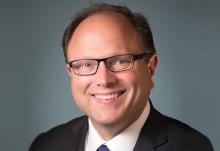As a student, do you ever wonder what it’s like to specialize in family medicine? Here’s your chance to find out.
The family physician is a key player in primary care as the nation struggles with a predicted shortage of 46,000-90,000 physicians by 2025. An estimated12,000-31,000 of these physicians will be in primary care, according to the Association of American Medical Colleges.
These numbers have spurred recent legislation that could benefit students pursuing graduate medical education programs in primary care in the coming years, so if family medicine interests you, it’s a timely specialty to explore. Start by hearing what it’s really like to practice family medicine from a physician in the field.
Meet Robert Wergin, MD, a family physician and president of the American Academy of Family Physicians (AAFP). Dr. Wergin is the latest featured physician in AMA Wire’s “Shadow Me” Specialty Series, which offers advice directly from physicians about life in their specialties.
Read his insights to help determine whether a career in family medicine is a good fit for you.
 “Shadowing” Dr. Wergin
“Shadowing” Dr. Wergin
Specialty:
Family medicine
Practice type:
Small practice in a rural community of about 2,000 people
A typical week:
I practice the full spectrum of primary care, from obstetrics to geriatrics, at Milford Family Practice Center. But my day doesn’t end there. I also provide emergency room coverage, hospital coverage and serve as the medical director of Crest View Care Center. I generally work 60-70 hours per week.
The most challenging aspect of caring for patients in family medicine is:
The most challenging aspect is definitely paperwork—particularly any paperwork that is unrelated to patient care.
The most rewarding aspect of caring for patients in family medicine is:
The most rewarding part is the relationship I have with my patients, and that outweighs all the challenges. As a family physician in a small town, I care for generations of families over the entire life span. I get to know people so well that I sometimes feel like I’m part of the family. I can’t tell you how fulfilling those relationships are.
Three adjectives to describe the typical physician in family medicine:
Caring. Comprehensive. Patient-centered.
How my lifestyle matches or differs from what I envisioned in medical school:
In medical school, I envisioned becoming an integral part of my community and working with patients to improve their health. Years later, I’m proud to say that I’m doing exactly that.
The main skills every physician should have for family medicine but won’t be tested for on the board exam:
A caring attitude and sense of altruism.
One question every physician in training should ask themselves before pursuing family medicine:
“What is going to make me feel happy and self-actualized?”
The three books I think every medical student interested in family medicine should read are:
- Executive Strategies for Tough Times by Donald T. Phillips
- The Song of the Bird by Anthony De Mello
- The Tipping Point by Malcolm Gladwell
If you want to learn more about family medicine, I also recommend students follow:
The AAFP’s website is a great resource for health care professionals. I especially like our Family Medicine SmartBrief, which is a free daily email newsletter that gives you a quick overview of the latest news in family medicine.
One thing students considering family medicine should remember:
Family physicians often practice late into life due to our love for the profession. Family medicine isn’t a job. It’s a passion.
If my life in family medicine were a song, it’d be:
“Imagine” by The Beatles.




